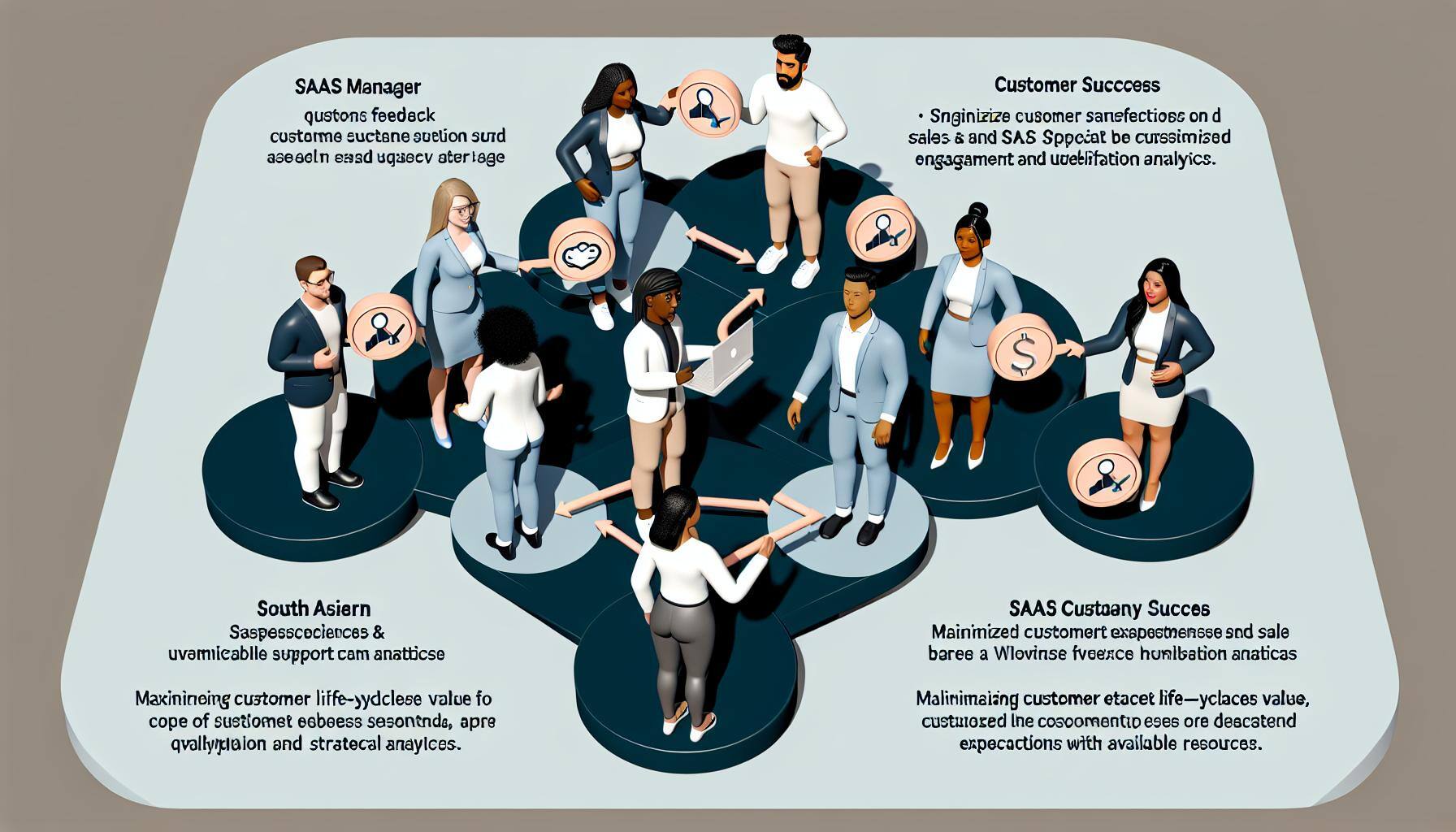Proven Strategies to Reduce Customer Churn in B2B SaaS
In the fast-paced world of B2B SaaS, keeping your customers is the difference between thriving and merely surviving. High churn rates can drain your...
7 min read
Brian Polackoff
:
Jun 12, 2024 11:14:00 AM

In the realm of Software as a Service (SaaS), understanding the crucial role of customer education can significantly impact churn rates. Customer education is paramount in ensuring customer success and satisfaction in the ever-evolving landscape of SaaS companies. Let's delve into the various aspects of how customer education influences churn rates and explore strategies and best practices that can help reduce churn through effective customer education programs.
Customer education plays a pivotal role in SaaS companies by empowering users to make the most of the products or services offered, helping SaaS companies increase user engagement and product utilization. By providing customers with the necessary knowledge and resources, companies can boost product adoption rates and enhance customer retention. Implementing a robust customer education program can lead to improved customer success and satisfaction levels, ultimately reducing churn rates and increasing customer loyalty.
Implementing a structured customer education program not only helps customers navigate the complexities of a SaaS product or service but also fosters a positive customer experience. By offering resources such as video tutorials and interactive learning experiences, companies can drive product adoption and increase customer satisfaction, revealing the direct impact of customer education on helping users fully engage with and utilize SaaS platforms. Investing in customer education initiatives is an essential component of building a loyal customer base.
Customer education is instrumental in enhancing customer success by equipping users with the knowledge and skills needed to maximize the value derived from a SaaS product or service, thereby directly affecting customer satisfaction levels. By providing effective customer training and support, companies can guide customers through their journey, increase customer engagement, and ultimately improve customer retention rates. Customer feedback and metrics can further help in measuring the success of customer education initiatives and refining strategies for better outcomes.
As the SaaS industry continues to evolve, the importance of customer education in driving customer success is becoming increasingly evident. SaaS companies that prioritize customer education are better positioned to reduce churn rates, enhance customer satisfaction, and stay ahead of competitors, illustrating the critical relationship between customer education and customer success in the SaaS industry. Digital customer education is set to play a more significant role in the future, offering personalized learning experiences and tailored resources to meet the diverse needs of customers.
Effective customer education programs are key to reducing churn rates and improving customer retention in SaaS companies. By continuously engaging customers through educational content, companies can enhance the overall customer experience and encourage long-term loyalty. Measuring the success of customer education initiatives through relevant metrics and customer feedback is essential in optimizing strategies and driving positive outcomes.
Implementing effective customer education programs focused on enhancing product knowledge and usability can significantly impact customer retention rates and help users more effectively use your product. By providing timely and relevant educational resources, companies can help customers overcome challenges, increase satisfaction levels, and strengthen their loyalty towards the brand, thereby enhancing the relationship between customer education and customer success. Customer education isn't just about offering information; it's about creating a valuable learning experience that resonates with users. Here are some strategies to create successful customer education programs:
1. Identify Customer Needs: Conduct surveys, interviews, and feedback sessions to understand the specific knowledge gaps and pain points of your customers, a focus on customer behavior that's important in SaaS. This will help in designing a curriculum that addresses their unique challenges and enhances their user experience.
2. Create Compelling Content: Develop engaging and visually appealing educational materials such as tutorials, walkthrough videos, webinars, FAQs, and user guides. Make sure the content is easy to understand, relevant, and accessible across different devices and channels.
3. Personalize Learning Paths: Segment customers based on their level of expertise, preferences, and usage patterns. Offer tailored learning paths that cater to their individual needs and goals, allowing them to learn at their own pace and on their own terms.
4. Provide Ongoing Support: Offer continuous support through live chat, forums, email, and phone helplines. Encourage customers to ask questions, seek clarification, and share their feedback to ensure they feel valued and supported throughout their learning journey.
5. Measure Success Metrics: Track key performance indicators such as customer satisfaction scores, engagement rates, retention rates, and product usage data. Analyze this information to assess the effectiveness of your education programs and make data-driven decisions to optimize them for better results, reinforcing the importance of a relationship between customer education and ongoing success initiatives.
6. Foster a Community of Learners: Build a sense of community among your customers by creating discussion forums, online groups, and social media channels where they can connect, share their experiences, and learn from each other. Encourage peer-to-peer support and collaboration to enhance the learning experience and foster loyalty.
7. Reward and Recognize Achievement: Motivate customers to engage with the educational content by offering incentives, rewards, certifications, and badges for completing courses, participating in quizzes, and achieving milestones. Celebrate their success and acknowledge their efforts to reinforce a positive learning culture.
By investing in customer education programs, companies can empower their customers to make the most of their products and services, drive long-term engagement, and increase customer retention rates. It's not just about selling a product; it's about building lasting relationships and creating value for customers through continuous learning and support.
Customer education plays a crucial role in enhancing customer satisfaction by empowering users to make informed decisions and optimize their usage of a SaaS product or service, which directly impacts customer success and retention. By offering personalized learning pathways and addressing customer needs through tailored educational content, companies can ensure a seamless customer journey and increase overall satisfaction levels. Investing in customer education is an investment in long-term customer relationships and business growth. Customer education is essential for ensuring that customers fully understand the value and capabilities of the product or service they have purchased, which significantly contributes to the customer lifetime value. By providing educational resources such as tutorials, guides, webinars, and training sessions, companies can help customers unlock the full potential of the product and maximize its benefits. This leads to higher customer satisfaction and retention rates, as satisfied and knowledgeable customers are more likely to continue using the product and recommend it to others.
In addition, customer education can help reduce the number of support requests and complaints, as customers will be better equipped to troubleshoot issues on their own. This not only saves time and resources for the company but also improves the overall customer experience by providing quick and efficient solutions to customer problems.
Moreover, customer education is a strategic approach that can help companies build trust and credibility with their customers. By demonstrating a commitment to educating and supporting their customers, companies can establish themselves as experts in their field and solidify their reputation as a trusted and reliable partner.
Overall, investing in customer education is a win-win for both companies and their customers. By providing valuable educational resources, companies can empower their customers to succeed and achieve their goals, leading to higher satisfaction levels, increased loyalty, and ultimately, business growth.
Measuring the impact of customer education initiatives is essential for evaluating their effectiveness and making data-driven decisions. By analyzing key metrics such as customer churn rate, product adoption rate, and customer satisfaction scores, companies can identify areas for improvement and refine their customer education strategies. Gathering insights from customer feedback and engagement data can further help companies gauge the success of their educational programs and optimize them for better outcomes.
Implementing strong customer education programs and following best practices are fundamental for SaaS companies looking to drive customer success and reduce churn. By adopting successful customer education approaches and prioritizing customer engagement, companies can create a loyal customer base and differentiate themselves in a competitive market. Let's explore why customer education is vital for SaaS companies and how it can contribute to long-term growth and success.
Implementing robust and structured customer education programs is key to ensuring that customers derive maximum value from a SaaS product or service, which in turn can enhance customer lifetime value. By offering comprehensive training resources, engaging video tutorials, and proactive customer support, companies can help customers navigate complexities and drive product adoption. Providing a seamless learning experience is crucial in building trust and enhancing customer satisfaction, leading to improved retention rates.
Successful customer education approaches in SaaS involve tailoring educational content to meet the diverse needs of customers and aligning learning pathways with their goals and preferences. By personalizing the educational experience and delivering relevant information at the right time, companies can enhance customer engagement and loyalty. Offering a variety of educational resources, such as guides, webinars, and knowledge bases, can further enrich the learning journey and drive positive outcomes.
Customer education is vital for SaaS companies as it not only aids in reducing churn rates but also adds value to the overall customer experience. By investing in customer education initiatives, companies demonstrate a commitment to customer success and long-term relationships. Enhancing customer knowledge and empowering users to make the most of a product or service is essential in building a loyal customer base and driving business growth. Customer education isn't just an added service; it's an integral part of the value proposition in the SaaS industry.
By understanding the impact of customer education on SaaS churn rates and implementing effective strategies and best practices, companies can position themselves for success in a competitive market. Prioritizing customer education not only enhances customer satisfaction but also fosters long-term loyalty, ultimately leading to reduced churn rates and increased profitability in the SaaS sector. Some effective strategies for customer education in SaaS companies include:
1. Onboarding programs: Providing new customers with a structured onboarding process helps them understand how to use the product, its features, and benefits. This reduces the likelihood of customers becoming overwhelmed or frustrated and increases their likelihood of becoming long-term users.
2. Knowledge bases and self-service resources: Offering comprehensive knowledge bases, tutorials, FAQs, and other self-service resources empowers customers to find answers to their questions quickly and independently. This reduces the need for extensive customer support and increases overall customer satisfaction.
3. Webinars and workshops: Hosting webinars and workshops on various topics related to the product helps customers deepen their understanding and discover new ways to leverage its capabilities, a method to improve your customer education strategies. This interactive format allows for direct communication and engagement with customers.
4. Regular communication: Keeping customers informed about product updates, new features, and best practices through regular email newsletters or blog posts helps them stay engaged and up-to-date. This proactive approach demonstrates a commitment to customer success and showcases the value of the product.
5. Customer feedback and surveys: Soliciting feedback from customers through surveys and reviews helps companies understand their needs, challenges, and preferences. This valuable insight, based on user feedback, can be used to improve the product, enhance the customer experience, and address any issues before they escalate, demonstrating how customer education helps SaaS companies adapt and grow.
Overall, investing in customer education initiatives not only helps reduce churn rates but also strengthens customer relationships and drives growth in the SaaS industry, highlighting the important role that customer education and customer success play in increasing customer lifetime value. By prioritizing customer success and focusing on empowering users to make the most of their product, companies can differentiate themselves in a competitive market and build a loyal customer base.

In the fast-paced world of B2B SaaS, keeping your customers is the difference between thriving and merely surviving. High churn rates can drain your...

Customer churn represents a critical challenge for B2B SaaS companies. Churn occurs when customers stop using a product or service, leading to lost...

In the highly competitive landscape of B2B SaaS, the importance of a proficient customer success team cannot be overstated. A well-coordinated team...